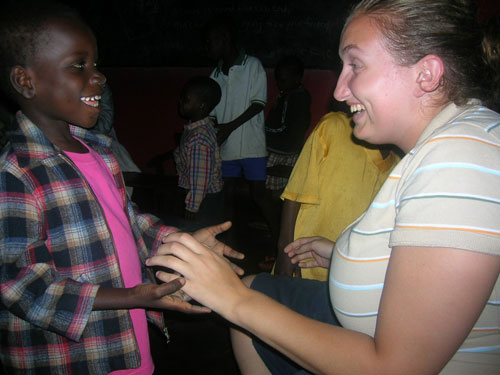
By Julie Hirshan | gargoyle@flagler.edu
“Obruni? Obruni!!” the children called after us as we passed by, hesitant at first, but then excited that they’d caught a glimpse of the outsiders.
“Obruni” means “white,” and my sister’s fair skin and blonde hair stood out like moonlight on the ocean. There is no doubt that we look like we don’t belong.
The first question I get asked when I tell people that I went to Africa this past summer is, “What did you do there?” I usually reply that I volunteered at an orphanage, but a more appropriate answer would be that I had the most eye-opening experience of my life.
 Audio Slideshow: Loving Without Boundaries in Africa
Audio Slideshow: Loving Without Boundaries in Africa
My sister, Grace, and I were assigned to Trinity Home Foundation in Tutu, Ghana, through a global volunteering organization called Cosmic Volunteers.
Elvis, the Cosmic Volunteers contact in Ghana, greeted us at the airport. He drove us to the place where we were staying. On the drive into the Akuapem Hills, we learned driving is very different. Our village did not have any running water, and electricity is only turned on 12 hours per day.
When we arrived in Tutu, we were shown to the house where we were staying, which was specifically for volunteers. Although English is the official language of Ghana, there are 49 different tribal dialects spoken in various regions of the country.
In Tutu, twe is spoken, and I was terrified that I wouldn’t be able to communicate with the children. When we walked into the classroom, the children cheered. Sophia Asare, the woman who runs the orphanage, introduced Grace and I. The welcome we received was enormous. As soon as we got outside, the children came running to us, asking us to play with them.
Although they all spoke with an accent, their English was very good. The boys grabbed Grace and pulled her into the outside center playing area. She pushed them around on tricycles and child-sized cars, most likely donated by an organization from the United States.
The young girls sat on my lap and told me stories about school, where they learn English and mathematics, among other things. They warmed up to us immediately, and their trust made us feel comfortable.
These children have no inhibition; they love without boundaries. There are 40 children who live at the orphanage, ranging in age from two to 17. They call Sophia “ma,” and there are about six other women who live and work with the children at the orphanage. When I left Ghana, I know I left a piece of my heart with each of those children.
Daniel was like the little brother I never had, and he constantly reminded everyone that I was his friend. When he went to play with his toy cars, if someone else came to sit on my lap, he would come back and push them away. I found out after I had left that 4-year-old Daniel asked where I was for weeks after I had gone.
Lukia always wanted to be held or carried. She’s 5 years old, and it’s hard to compete with the younger children for the attention she craved. Lukia wasn’t feeling well one day, and came to sit on my lap. When she fell asleep, I carried her to the girls’ bedroom for a nap.
I found out the next day that Lukia had malaria, and had been sick to her stomach all morning. None of the women at the orphanage seemed worried — they said she had been sick with malaria before.
Gabriel is Daniel’s best friend, and the two of them do everything together. Daniel looks out for 3-year-old Gabriel like a brother, and the other children refer to them as “the twins.” One of the first volunteers that ever came to the orphanage, Mary, is adopting Daniel and Gabriel. They will live with her in Spain, and I am so glad that they will be together.
Rejoice is helpful and quiet. She’s usually in the last group for meals, and she doesn’t say much. But she smiles all the time, and always helps out with chores. Sophia reprimands her, telling her that at 8 she is too young to be doing so much work, but nothing stops Rejoice from helping.
Linda, at age 4, is one of the brightest girls I have ever met. She will spell any word for you, and offers to “do your head,” which means she wants to play with your hair.
One day, she looked up at me with her big, brown eyes and asked me to take her home with me. There were tears in my eyes when I told her she would have to stay. One day I hope that I can bring Linda to the United States and giver her the amazing opportunities that she deserves.
Emmanuella is an adorable girl, but a troublemaker. Her favorite game is to wear other children’s sandles, and shriek as they run to catch her and get their shoes back. Her hair is braided into long extensions, and she likes to wear a uniform, even though she’s 3, and too young to go to school.
For a long time, I thought she didn’t speak any English. Most of the time, she pouts and runs away. Then, one day, she was sitting on Grace’s lap, and she pretended to call Grace with a ruler she was using as a telephone. When Grace answered, Emmanuella carried out the entire conversation in perfect English.
Since I’ve been back in the States, I’ve told anyone that will listen about my experiences. It changed my life, and I can’t wait to go back.
I miss the children every day, and hope that I made an impact on their lives, if just for a day.


Be the first to comment on "Loving without boundaries in Africa"